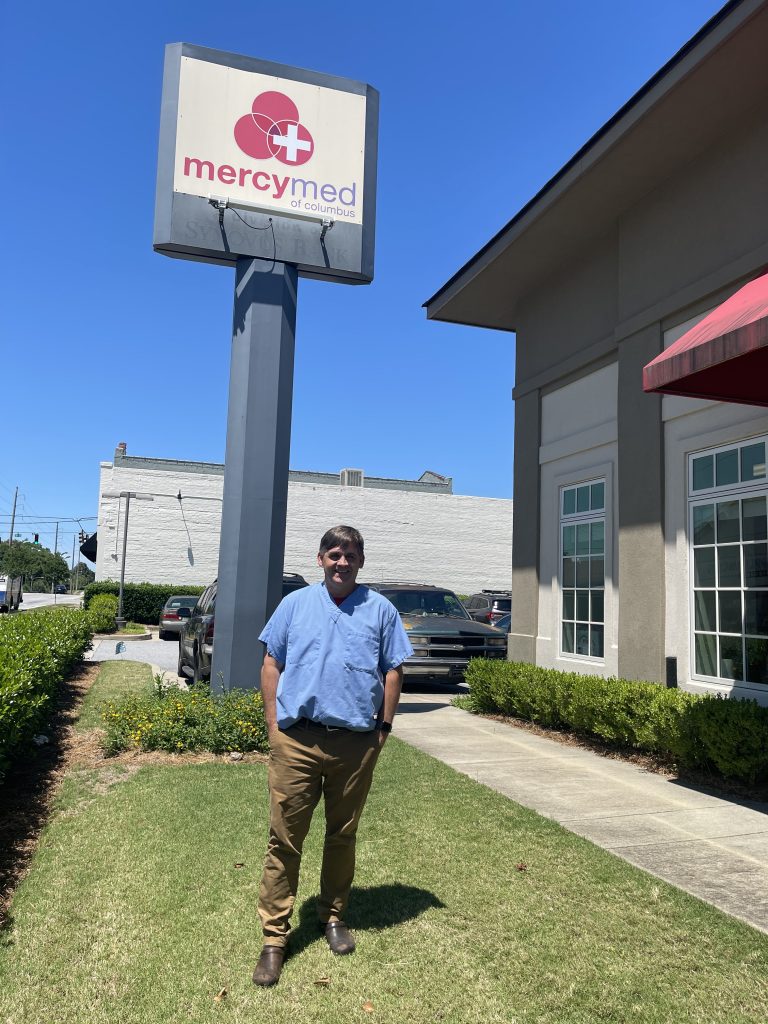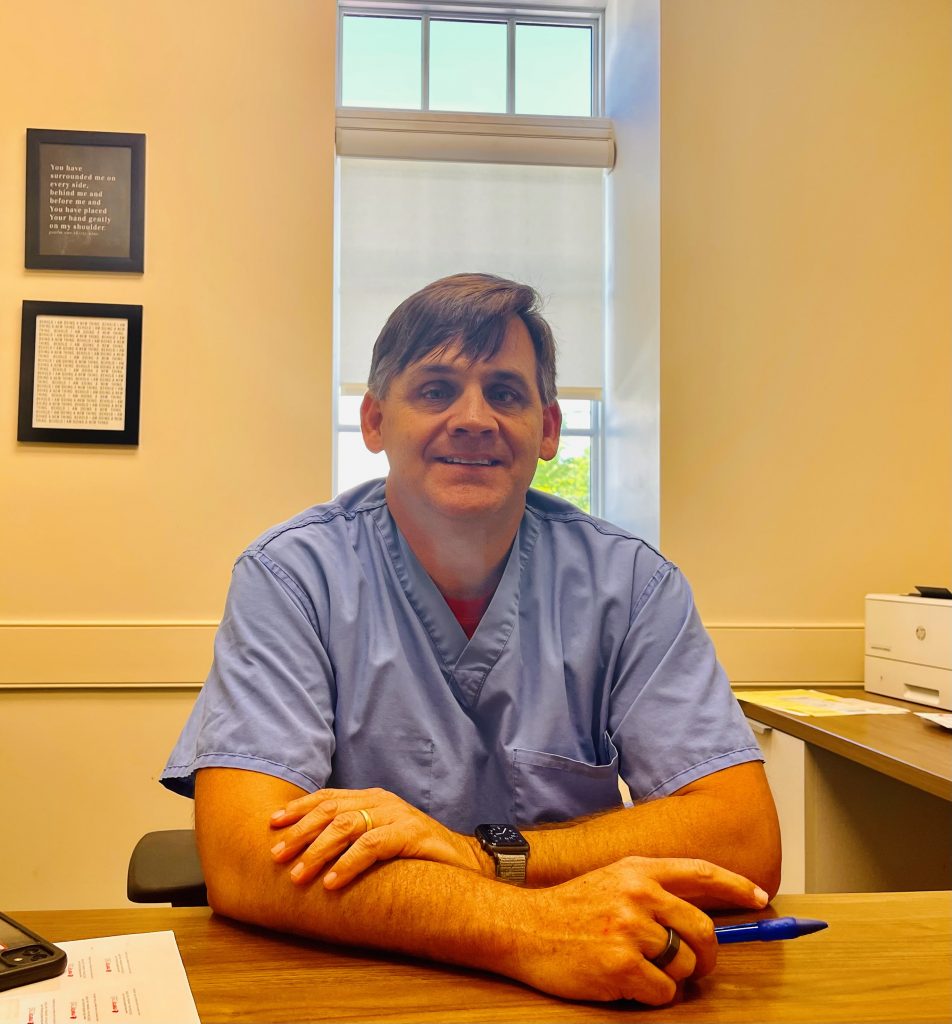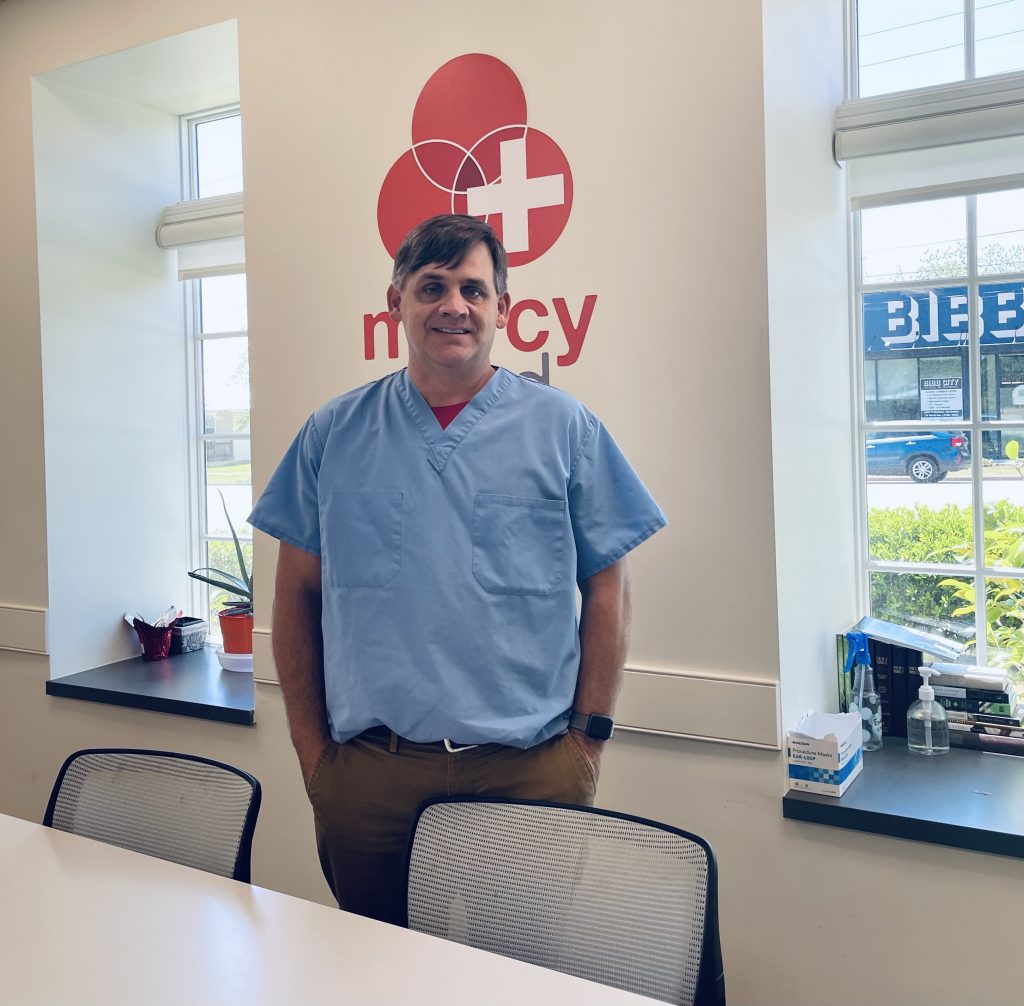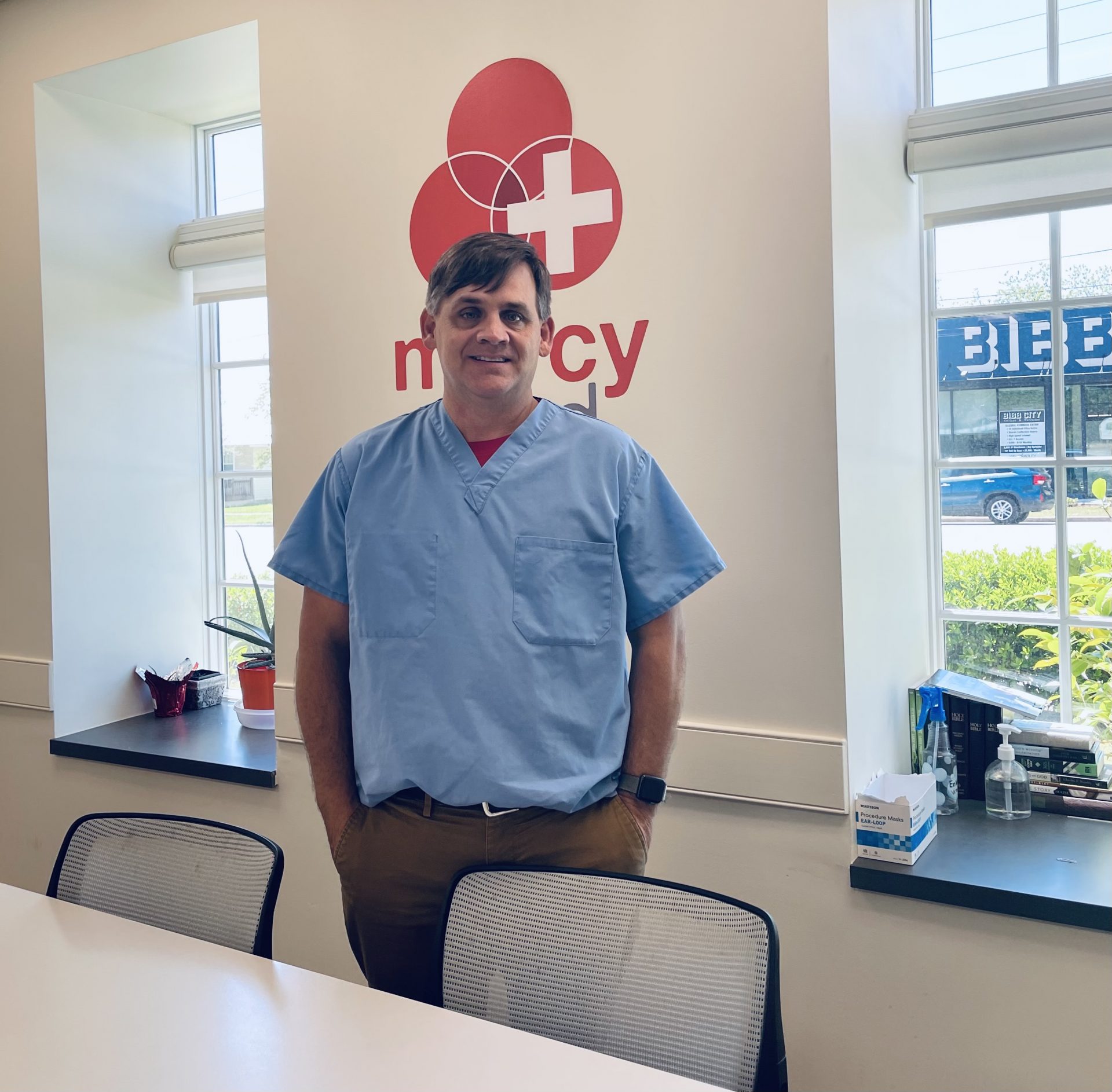The MercyMed staff was on the frontlines in treatment and testing for COVID since the earliest days of the pandemic. How were y’all able to take such an aggressive approach?
“We just saw a need. So I called the Health Department and asked, ‘How can we help?’ That was the day that the governor gave his first speech about it. They said, ‘We need someone to help us test.’
We did the first outpatient testing in Columbus, Georgia, because we were asked to. From there, it spiraled to realizing, ‘Someone has to jump in here and start caring for folks.’
We called up a great clinic in Birmingham that did a mass screening and got a lot of good information from them. That’s when we did a mass screening at Cascade Hills [Baptist Church]. We screened 1500 people and we had 180 positives — over 10%, which is a ton.
In the beginning, nobody really knew what to do. We had Ben B. Gordy Construction Co. build us a bubble, there we saw 140 positive patients wearing haz-mat suits everyday for 3 weeks, working 12-hour days. We ran chest x-rays, EKGs, vital signs and then we’d spray the entire room down and then see the next patient.
We came up with the idea of Zoom calls where all COVID-postivie patients could do 2 calls a week with us. We had a team go out in case you needed food, or a thermometer, then we’d take it to your house. We had med-school students calling them to make sure they’re doing okay. We set up a prayer line up for them.
I started the clinic because I feel like I am called by God to care for the least of these. So for me, I knew it was scary but I knew God called me to step into situations like this and go for it.”
How does faith inform the overall operations here at MercyMed?
“Our mission statement says, “We exist to proclaim Jesus Christ as Lord and demonstrate His love.” I love that thought.
Demonstrating the love of Christ is just serving people. Like with our homeless population coming in and taking their socks off and seeing if they have any wounds. We just had a child come in who wasn’t doing well and a nurse made 5 phone calls to see what we could do to help him.
It’s about figuring how to go the extra mile for somebody. That’s what we really try to do. And to serve them. That’s the driving force behind everything we do.”

How does faith impact your individual approach to medicine?
“When I was in med school, I had a friend call me up and asked, ‘Who are the first doctors in Scripture?’ From a chapter in Leviticus, it was actually the priests. My friend told me, ‘Grant, you have a priestly duty.’ I feel like what I’m doing is loving and serving people from a priestly perspective.
Jesus said, ‘When you do something for the least of these, you’re doing them as if you’re doing them to me.’ So every patient is almost like Christ and I want to serve them. We have folks come in that struggle with all kinds of things — addiction, prostitution, different issues. But I get to see and treat them as if they’re made in the image of God and give them the best I can.
In Scripture, there’s the verse, ‘Don’t lose heart in doing good.’ Sometimes, I get tired. Sometimes, taking care of folks who don’t have any means and finding out they have cancer, can be hard on the soul. To be able to go back to Scripture and read ‘Don’t lose heart,’ it encourages me to keep on keeping on. To not give up. Keep pushing forward.”
How did you first realize the need for this type of health care in this community?
“I was in ministry out of college in Atlanta and it seemed like, for a lot of our friends in poverty, there was help with food, clothes, and housing. But there was nobody to care for their medical needs.
When I decided to go to med school, my goal was to take care of those who fall through the cracks, who cannot get their basic health-care needs met. So I went back to med school with that vision, that purpose.
I did my training in Memphis, because they have a couple of clinics that are fantastic that are doing this and doing it well. After Memphis, I moved to Augusta, Georgia, in 2007 to open a clinic just like this with my friend.
I was running the Augusta clinic from 2007-2011, when I felt called to open another one. I had a couple of opportunities but Hal Brady from St. Luke [Methodist Church] called me and asked me to consider it here. I said, ‘’ll never come back to Columbus.’ He was very persistent.
I came to Columbus and rode all over the city and saw that there were services here. But the need is so great that there’s always areas where you can give back. After much prayer and talking to folks in the community, we decided to come here.”
From a practical standpoint, considering that you treat the uninsured and low-income, how do you make it work? How do you keep the lights on?
“We’re not a free clinic. And that’s not to make money. We feel it’s important that folks partner with us in their care. Most folks that come through pay as little as $30. They’ll get seen by either me or another provider, all their lab work done for free, and medicines sent to a place where we know they’ll be cheap.
We do have a small percentage of insured patients and that also helps. That brings in 40-45% of our overall budget, so we have to go out and raise about 55% of our budget.
The biggest expense is salaries. So the way to make it work is we don’t pay our providers as much as you might normally would. That’s just a heavy cost. We joke that we’re not underpaid doctors, we’re really well-paid missionaries. But it’s okay — we want to work with the poor.
The other aspect is through a lot of fundraising.”
Y’all have a farm here and with the Medically Tailored Meals, how do you accomplish this Food is Medicine approach?
“I think our greatest issue with health in today’s world is the way we eat and the way we live.
We’re overweight and we’re obese. That’s destroying us in so many different ways. We have diseases that didn’t exist 100, 200 years ago because we’re not nearly as active as we used to be and not eating nearly as healthy. That’s why we have diabetes, heart disease, and strokes.
Poor diet is as bad as smoking, if not worse. But I think it’s going to be a lot harder to overcome than smoking. We’ve done a great job teaching folks not to smoke. But we have to break cycles of generations who haven’t seen their parents eat healthy. That’s a huge task but we’re excited for it.
Everything we do, we learn a little bit more. We moved up from a small garden out back to the farm we have today. We’re in the process of partnering with Olivia [Amos, director of The Food Mill], and we have a dietician here. This program offers them free meals for 3 months — that’s the best deal in town!
The whole plan is to change how people think and feel about food and how they eat food.”
What’s your vision for the future of MercyMed?
“What we’re excited about next is we recently purchased more land and are pushing forward our Health & Wellness program.
We’re going to expand our clinic to see more patients and expand our physical therapy. We’re going to give folks a safe place to exercise. In the midst of that will be a place to get their fruits and vegetables here at a reduced price.
Also, counseling, full-time dentistry and a pharmacy. We work to break down barriers for patients, so it’s going to be great for them to one day have their medicine filled before they leave the doctor’s office.
We’re excited about expanding over the next two years to become a center where they can do all that at one location.”

Age: 49
Education: Clubview>Richards>Brookstone. University of Georgia. MercerMedical School.
Favorite meal: Steak and twice-baked potato
Favorite movie: Shawshank Redemption
Biggest challenge you face on the job: “Staying faithful to Christ. There’s always so much going on, things moving quickly in different directions, it’s staying centered on the reason why we’re doing it and not losing sight of that.”
BIggest opportunity you face on the job: “Loving people. Seeing patients. So often, they feel lonely, not accepted, and ashamed. I have the opportunity to come in here and be kind. Give an encouraging word. Give them hope. Build dignity back into their life.”
Reason to get up and go to work everyday: “My 4 daughters spending all my money. *laughs* I do love serving people but I also love setting people up for success. Sometimes I feel my biggest ministry is to my staff, because I want them to live out that mission as much as I do.”


